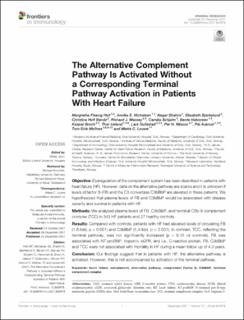The Alternative Complement Pathway Is Activated Without a Corresponding Terminal Pathway Activation in Patients With Heart Failure
Shahini, Negar; Bjørkelund, Elisabeth; Bendz, Christina; Massey, Richard J; Schjalm, Camilla; Halvorsen, Bente; Broch, Kaspar; Ueland, Thor; Gullestad, Lars; Nilsson, Per H.; Aukrust, Pål; Mollnes, Tom Eirik; Louwe, Maria Cornelia
Journal article, Peer reviewed
Published version

Åpne
Permanent lenke
https://hdl.handle.net/11250/2985024Utgivelsesdato
2021Metadata
Vis full innførselSamlinger
Originalversjon
10.3389/fimmu.2021.800978Sammendrag
Objective Dysregulation of the complement system has been described in patients with heart failure (HF). However, data on the alternative pathway are scarce and it is unknown if levels of factor B (FB) and the C3 convertase C3bBbP are elevated in these patients. We hypothesized that plasma levels of FB and C3bBbP would be associated with disease severity and survival in patients with HF. Methods We analyzed plasma levels of FB, C3bBbP, and terminal C5b-9 complement complex (TCC) in 343 HF patients and 27 healthy controls. Results Compared with controls, patients with HF had elevated levels of circulating FB (1.6-fold, p < 0.001) and C3bBbP (1.3-fold, p < 0.001). In contrast, TCC, reflecting the terminal pathway, was not significantly increased (p = 0.15 vs controls). FB was associated with NT-proBNP, troponin, eGFR, and i.e., C-reactive protein. FB, C3bBbP and TCC were not associated with mortality in HF during a mean follow up of 4.3 years. Conclusion Our findings suggest that in patients with HF, the alternative pathway is activated. However, this is not accompanied by activation of the terminal pathway.
